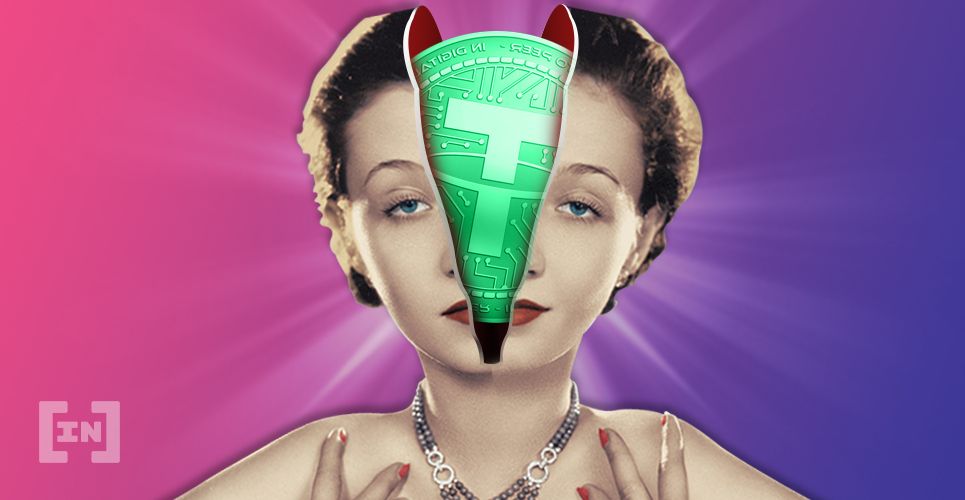BeinCrypto has asked experts what the future holds for tether (USDT). Can it survive the courts, and what will the consequences be?
Tether and Bitfinex finally had to turn over documents to authorities in New York. They had extended a deadline to produce financial documents to be scrutinized by the courts. If the New York attorney general can find proof of fraud, then the number-three cryptocurrency could be in for a rocky road. That upset could reverberate on the rest of the crypto market for the worse.
But documents have been handed over, and there is still time to see. BeInCrypto asked experts to weigh in.
American justice for Tether
Maria Stankevich of British cryptocurrency exchange EXMO UK described the legal issues facing Tether in the United States and beyond.
“Back in the spring of 2019, as part of the lawsuit of the New York State Attorney’s Office against Tether, the chief lawyer of the stablecoin issuing company, Stuart Hogner, indicated that USDT was backed by fiat reserves by only 74%, and 26% was backed by other assets,” Stankevich said.
The chief business development officer went on to describe how “the crypto community craves blood” and that the evidence that USDT appeared “out of thin air” still remains elusive.
She continued:
“From now on, much will depend on the work in the Prosecutor General’s Office and when they deem it necessary to make the established facts public. The main cause of concern for most market participants is that, if necessary, Tether will not be able to fully return their fiat collateral to USDT token holders.”
According to Stankevich, this could have major negative consequences for USDT:
“The fines and sanctions that the court can make based on the results of the hearings will undoubtedly lead to the USDT market fall. Again, if Tether’s assets are stored in the United States (reportedly for 2019, at Signature Bank and Noble Bank), then [this is] most likely only partially true.”
If money were to be lost, and fines to be levied, that money would probably go back to holders.
“American justice primarily protects the rights of its citizens. Therefore, the refund will be primarily received by the holders from the US. Users from other countries may suffer more. True, with such a turn of events, claims from other countries may fall on Tether,” Stankevich explained.
Full-blown collapse?
A full blown collapse of USDT tokens could have a huge effect on the wider market as well. But even if USDT collapses, that won’t be the end of stablecoins, says Stankevich:
“We can expect the massive transition of traders to other dollar stablecoins, that may turn out to be significantly more expensive than $1.”
While a complete collapse is possible, that is not the only consequence Tether could face if prosecutors find proof of fraud — bigger fines imposed on iFinex or Bitfinex look more plausible.
Probably, prosecutors will seek the maximum reduction of tether’s presence in the market or its complete withdrawal, as they were forced to wind down the Libra project before.
Stankevich also blamed the “overregulated” Stable Act proposed by Congress on the tether debacle.
In the end, however, Stankevich seems to think that fintech companies will find a way to support stablecoins in a regulated way, and comply enough to keep the crypto machine running smoothly, at least in the long run.
The easy way out for tether
Lou Kerner, director of stablecoins at Quantum Economics, took a more cynical, though perhaps realistic view:
“People take tether as a dollar, because they think the next guy will. At best, tether is fully backed. At worst, the same thing backs tether as the US dollar. And like the US dollar, tether will work until it doesn’t.”
Then of course, there was the real risk. Like Stankevich, Kerner felt that even if tether crashed and burned, there would still be more stablecoins to take its place:
“In terms of it being a systemic risk, a tether implosion would certainly be harmful near term, but there will be others, maybe better ones, that would quickly emerge in its place as the dominant stablecoin.”
There is of course the issue of price manipulation with bitcoin (BTC). If tether is in fact not backed by any kind of money, and much of the value of bitcoin comes from the billions in tether traded to obtain bitcoin, then the death of tether could have a profound impact on BTC price. Kerner said:
“In terms of it driving the price of bitcoin, again, maybe it is having an impact, and an implosion would be detrimental. But the bitcoin movement is not built on the back of tether.”
The story ends here
Haohan Xu, CEO of Apifiny, a global digital asset trading network, thinks that one way or another, Tether is going to have to pay. He said:
“Tether will hear a reckoning. Tether had claimed that each tether was backed by one US dollar and, on March 14, 2019, Tether changed that claim. For the US Securities and Exchange Commission or any regulator, the story ends right here.”
Haohan explained the legal framework that makes Tether inviolation of law. Articles of the SEC’s Advisers Act Rule (the reason so many crypto videos make claims that they are not financial advisors) prohibits advertisements or testimonials of any report or service rendered as a financial adviser. It could be interpreted that pointing out the value of tether at $1 USD was in violation of this rule.
But it is the New York State Department of Financial Services (NYSDFS) that Hoahan says has the most evidence against Tether:
“New York’s adoption of the Martin Act has been interpreted to prohibit all deceitful practices, as well as false promises, related to the offer, sale, or purchase of securities and commodities. Now, with the addition of its Virtual Currency License, New York’s regulatory scope has been extended to stablecoins and digital assets.”
Bitfinex and Tether in trouble
Then there’s the trouble with Bitfinex and Tether. Their audit, performed by Freeh, Sporkin & Sullivan LLP in June of 2018, may not have been legal, or at least considered to be unbiased.
Haohan also believes that tether is undercollateralized:
Currently only .74 cents backs every tether token. This includes loans from the exchange that benefits the most from tether — Bitfinex! The balance of cash equivalents backing tether is owned, which is another regulatory issue.
Finally, Haohan believes that Tether and Bitfiniex will be found guilty of something, it just might be a while:
“The NYSDFS operations are being slowed down by covid-19 related tasks, so the ability to operate in a normal environment has delayed their pursuit of Tether/Bitfinex. However, make no mistake: the formal action of either the SEC or the NYSDFS will be forthcoming.”
Overall, the experts seem to agree that Tether is in some kind of trouble. Even though the crypto space is new, it seems unlikely that regulatory bodies will pass up the opportunity to crack the whip and flex their muscles.
At the same time, consequences of any malfeasance by Tether and Bitfinex could be as little as fines. Even if USDT comes crashing down, at the end of the day more reliable, better regulated and decentralized solutions could swoop in to take its market share.
Disclaimer
In compliance with the Trust Project guidelines, this opinion article presents the author’s perspective and may not necessarily reflect the views of BeInCrypto. BeInCrypto remains committed to transparent reporting and upholding the highest standards of journalism. Readers are advised to verify information independently and consult with a professional before making decisions based on this content. Please note that our Terms and Conditions, Privacy Policy, and Disclaimers have been updated.

